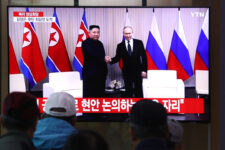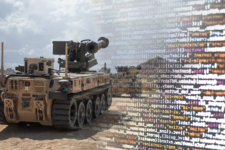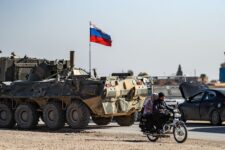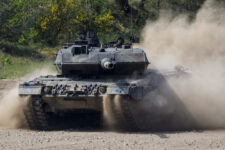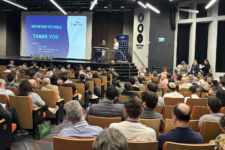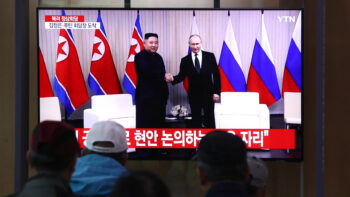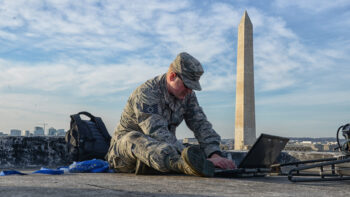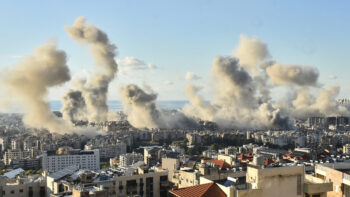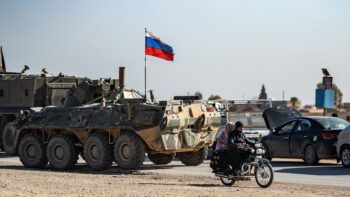
By Bob Morris
It seems a nonsensical question. Why would anyone – especially members of the United States Congress – not condemn the IED attack at the Boston Marathon and IEDs themselves?
The House of Representative has a chance to demonstrate its global leadership position—and also do something no other country or organization has done before. It can condemn the use of IEDs anywhere in the world by passing House Resolution 190. At the same time it will condemn the Boston Marathon attack and recognize that first responders carry a disproportionate burden of the IED threat and call for measures to support them in that role.
The public can make their support for this effort known through an online petition and by contacting your ,embers directly.
Resolution 190 condemns the April 15, 2013, IED attack in Boston, Massachusetts and calls upon the United States, the governments of all nations, the United Nations, and other international organizations to condemn the use of IEDs, as well as to take actions to stop proliferation and trafficking of IED production materials and techniques. Before this resolution can move forward for a vote, the legislation must navigate through a complicated maze of committees in the House of Representatives. To date, 15 Members of Congress have signed on as co-sponsors.
Why should H. Res 190 matter to the public, Congress and the military?
IEDs have been in use in the United States for some time. Boston only highlights this fact. IEDs were used most notably in the April 1995 Oklahoma City bombing; the May 2010 attack in Times Square; and failed attempts by the Underwear and Shoe Bombers. The aircraft used to strike the Twin Towers and the Pentagon on September 11, were the largest IEDs ever created. The Department of Defense (DoD) ranks the U.S. among the top 5 countries in the world for the number of IED events within its own borders.
IEDs are a global threat, having become the weapon of choice for those who advance their cause through terror and violence. For the past several years, excluding Iraq and Afghanistan, three IED incidents occur each day on average in the rest of the world. The DoD’s Joint IED Defeat Organization (JIEDDO) has an even higher estimate of 500 IED incidents per month, again excluding Afghanistan and Iraq.
Historically, IEDs have been used in a variety of situations, including conflict and post-conflict environments (Iraq, Afghanistan, Sudan, Somalia, Israel, Lebanon and Palestine); illegal drug operations (Mexico, Columbia and Peru); insurgencies (Chechnya, Russia, Nigeria and Northern Ireland); election-related violence (Kenya, Nigeria and Ivory Coast); religious crises (India, Pakistan and Nigeria); ethnic conflicts (Nigeria, Rwanda, Democratic Republic of the Congo and Serbia); and other notable acts of terror (France, Norway, Russia, United Kingdom and United States).
Anders Behring Breivik, the perpetrator of the July 2011 attack in Oslo, Norway, described the IED he detonated—prior to killing 77 people at a youth camp—as a “marketing tool” for his extremist views.
The Boston Marathon attack exemplifies what some parts of the world experience on a regular basis. In the 10 days before the Boston marathon, IEDs took the lives of over 100 people in seven countries. In the 60 days prior to Boston, 64 people were killed in a Pakistani incident in February and 44 people were killed in Nigerian in March. When I wrote this it had been 22 days since the Boston Attack. In those 22 days IEDs have been used in 11 countries to kill more than 200 people.
The Boston attack also cast a spotlight on the severity of injuries resulting from IED use. Thousands of U.S. service members, veterans and civilians around the world endure the consequences of these horrific injuries.
IEDs cause the top four injuries to service members and veterans, including hearing loss, vision, traumatic brain injury and post-traumatic stress. According to the Blinded Veterans Association, approximately 34 percent of those injured by IED blasts suffer dual sensory loss of vision and hearing, in addition to the well documented physical wounds such as loss of limbs and other permanent physical disabilities. Treating these injuries is a challenge because the Defense Department inadequately shares blast trauma research with the Veteran’s Administration and other organizations.
According to Tom Zampieri of the Blinded Veterans Association (BVA) that supports H. Res. 190: “While the vast majority of our wounded warriors in Iraq and Afghanistan come from IED blasts that caused both visible and invisible injuries, the IED event in Boston demonstrates that every country is now at high risk of these weapons being used on civilians and first responders. We must share blast-related defense medical research between federal agencies to facilitate improved care and management of those wounded by IED’s.”
Lt. Gen. (Ret.) Frank Kearney, former deputy director for strategic operational planning at the National Counter-Terrorism Center and former deputy commander of Special Operations Command says, “H. Res. 190 is a long overdue and much needed piece of legislation for its support to veterans, service members, first responders and civilian victims of IEDs. More importantly,” says Kearney “Its condemnation of IEDs and call for specific actions will have a positive impact in reducing the proliferation of these devices by all nations and sends a very clear message and challenges to all nations to take responsibility for the solution. It should be pushed through the various committees and approved by the House without delay.”
Cleve Geer, AMVETS National Commander, says: “[AMVETS] applauds the initiative of the Global Campaign against Improvised Explosive Devices, and the leadership of Representative Hanna in bringing the critical issue of IEDs to the forefront of our national political discourse.” Geer goes on to say “With H. Res.190, Congress has the opportunity to curb the use of the signature weapon of terrorists around the world and to spare countless lives, military and civilian.”
The Iraq and Afghanistan Veterans of America and other groups have also endorsed the Global Campaign against IEDs and H. Res. 190.
The resolution advances a previous call by 92 members of the House of Representatives in their May 3, 2012 Letter to President Obama urging the U.S. to develop a strategy partnered with the Global Campaign, veterans groups and other public-private partners to identify the long term physical and psycho-social effects of IED related injuries; share findings and best practices with appropriate agencies and the private sector; and ensure adequate programs and benefits are available to veterans and their care-givers. Such findings will directly support treatment of civilians injured in the Boston IED attack.
To date, no nation has formally condemned the use of IEDs. While the United Nations annually issues a resolution condemning landmines, it has never issued a resolution condemning IEDs. UN organizations contacted declined to participate with the Global Campaign in taking action because they “do not have a UN mandate” to do so.
The response to IED use has historically been a predominately military one categorized by kinetic action. It is doubtful the American public will tolerate such an aggressive, deadly approach of “attacking the network” within the homeland including Mine-Resistant Ambush Protected (MRAP) vehicles patrolling the streets as we saw during the search for the Boston bombers.
In contrast, the Global Campaign against IEDs has been organized to provide a holistic solution involving public, private, and military partners bringing the broader global community together to take meaningful action against IEDs and those who use them.
It is worth noting that landmines and IEDs are not synonymous. IEDs are not covered under current international treaties to ban landmines. There is also a fundamental difference between the International Committee to Ban Landmines (ICBL) and the Global Campaign against IEDS. The efforts of the Global Campaign against IEDs are directed at those who use them for terror and violence and not the actions of any legitimate nation. According to the ICBL IEDs are beyond the scope of their efforts except those that are victim-activated and banned by treaty.
There is one point at which the landmine and IED issues converge. That is when landmines are used as components in IEDs. This happens when abandoned mine stocks are left uncontrolled and find their way into the black market. Therefore, supporting H. Res. 190 and condemning IEDs will not change anyone’s position on landmines or infer a ban on their use.
Rep, Richard Hanna (R-NY), the original sponsor of H. Res. 190, summed it up best: “Improvised explosive devices are the leading cause of injuries for American men and women in the military, and one can look to the Boston Marathon bombings to see the damage these weapons can cause to civilians. It is my hope that people all over the world will join in condemning the manufacture and use of IEDs to cause harm, inflict pain and promote terror.”
IEDs are not a partisan issue. They, and their impact on veterans, servicemembers, and civilians are a National issue and require the reasoned consideration of all Members of Congress.
Retired Colonel Bob Morris is the founder and president of the Global Campaign against IEDs.
Everything comes down to Ukraine: 5 stories from Europe in 2024
Of all that happened during the Ukraine conflict in the last 12 months, the deployment of North Korean troops to the Russian border territory of Kursk stands out from the pack.
